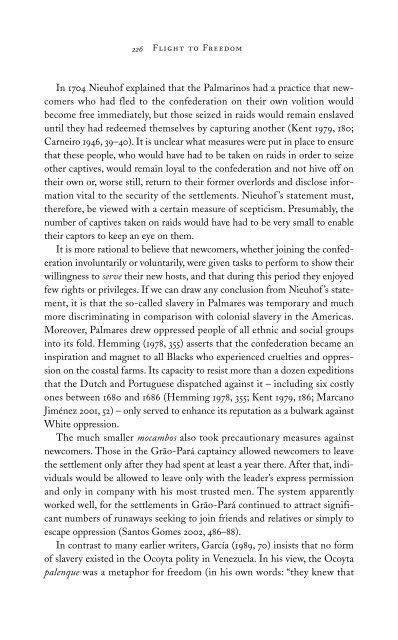60199616-flight-to-freedom-african-runaways-and-maroons-in-the-americas
60199616-flight-to-freedom-african-runaways-and-maroons-in-the-americas
60199616-flight-to-freedom-african-runaways-and-maroons-in-the-americas
You also want an ePaper? Increase the reach of your titles
YUMPU automatically turns print PDFs into web optimized ePapers that Google loves.
226 Flight <strong>to</strong> Freedom<br />
In 1704 Nieuhof expla<strong>in</strong>ed that <strong>the</strong> Palmar<strong>in</strong>os had a practice that newcomers<br />
who had fled <strong>to</strong> <strong>the</strong> confederation on <strong>the</strong>ir own volition would<br />
become free immediately, but those seized <strong>in</strong> raids would rema<strong>in</strong> enslaved<br />
until <strong>the</strong>y had redeemed <strong>the</strong>mselves by captur<strong>in</strong>g ano<strong>the</strong>r (Kent 1979, 180;<br />
Carneiro 1946, 39–40). It is unclear what measures were put <strong>in</strong> place <strong>to</strong> ensure<br />
that <strong>the</strong>se people, who would have had <strong>to</strong> be taken on raids <strong>in</strong> order <strong>to</strong> seize<br />
o<strong>the</strong>r captives, would rema<strong>in</strong> loyal <strong>to</strong> <strong>the</strong> confederation <strong>and</strong> not hive off on<br />
<strong>the</strong>ir own or, worse still, return <strong>to</strong> <strong>the</strong>ir former overlords <strong>and</strong> disclose <strong>in</strong>formation<br />
vital <strong>to</strong> <strong>the</strong> security of <strong>the</strong> settlements. Nieuhof ’s statement must,<br />
<strong>the</strong>refore, be viewed with a certa<strong>in</strong> measure of scepticism. Presumably, <strong>the</strong><br />
number of captives taken on raids would have had <strong>to</strong> be very small <strong>to</strong> enable<br />
<strong>the</strong>ir cap<strong>to</strong>rs <strong>to</strong> keep an eye on <strong>the</strong>m.<br />
It is more rational <strong>to</strong> believe that newcomers, whe<strong>the</strong>r jo<strong>in</strong><strong>in</strong>g <strong>the</strong> confederation<br />
<strong>in</strong>voluntarily or voluntarily, were given tasks <strong>to</strong> perform <strong>to</strong> show <strong>the</strong>ir<br />
will<strong>in</strong>gness <strong>to</strong> serve <strong>the</strong>ir new hosts, <strong>and</strong> that dur<strong>in</strong>g this period <strong>the</strong>y enjoyed<br />
few rights or privileges. If we can draw any conclusion from Nieuhof ’s statement,<br />
it is that <strong>the</strong> so-called slavery <strong>in</strong> Palmares was temporary <strong>and</strong> much<br />
more discrim<strong>in</strong>at<strong>in</strong>g <strong>in</strong> comparison with colonial slavery <strong>in</strong> <strong>the</strong> Americas.<br />
Moreover, Palmares drew oppressed people of all ethnic <strong>and</strong> social groups<br />
<strong>in</strong><strong>to</strong> its fold. Hemm<strong>in</strong>g (1978, 355) asserts that <strong>the</strong> confederation became an<br />
<strong>in</strong>spiration <strong>and</strong> magnet <strong>to</strong> all Blacks who experienced cruelties <strong>and</strong> oppression<br />
on <strong>the</strong> coastal farms. Its capacity <strong>to</strong> resist more than a dozen expeditions<br />
that <strong>the</strong> Dutch <strong>and</strong> Portuguese dispatched aga<strong>in</strong>st it – <strong>in</strong>clud<strong>in</strong>g six costly<br />
ones between 1680 <strong>and</strong> 1686 (Hemm<strong>in</strong>g 1978, 355; Kent 1979, 186; Marcano<br />
Jiménez 2001, 52) – only served <strong>to</strong> enhance its reputation as a bulwark aga<strong>in</strong>st<br />
White oppression.<br />
The much smaller mocambos also <strong>to</strong>ok precautionary measures aga<strong>in</strong>st<br />
newcomers. Those <strong>in</strong> <strong>the</strong> Grão-Pará capta<strong>in</strong>cy allowed newcomers <strong>to</strong> leave<br />
<strong>the</strong> settlement only after <strong>the</strong>y had spent at least a year <strong>the</strong>re. After that, <strong>in</strong>dividuals<br />
would be allowed <strong>to</strong> leave only with <strong>the</strong> leader’s express permission<br />
<strong>and</strong> only <strong>in</strong> company with his most trusted men. The system apparently<br />
worked well, for <strong>the</strong> settlements <strong>in</strong> Grão-Pará cont<strong>in</strong>ued <strong>to</strong> attract significant<br />
numbers of <strong>runaways</strong> seek<strong>in</strong>g <strong>to</strong> jo<strong>in</strong> friends <strong>and</strong> relatives or simply <strong>to</strong><br />
escape oppression (San<strong>to</strong>s Gomes 2002, 486–88).<br />
In contrast <strong>to</strong> many earlier writers, García (1989, 70) <strong>in</strong>sists that no form<br />
of slavery existed <strong>in</strong> <strong>the</strong> Ocoyta polity <strong>in</strong> Venezuela. In his view, <strong>the</strong> Ocoyta<br />
palenque was a metaphor for <strong>freedom</strong> (<strong>in</strong> his own words: “<strong>the</strong>y knew that


